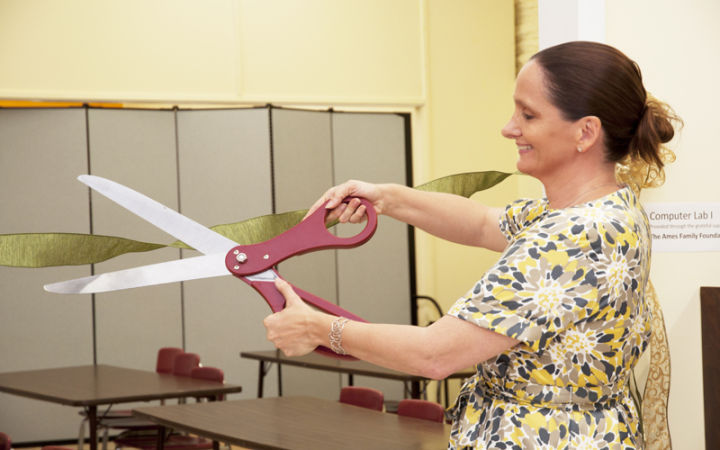
VERO BEACH — Bright and spacious, a newly reconditioned Life Enrichment Center at the Harvest Food & Outreach Center campus is open for business – the business of transforming lives through education and crisis navigation.
“We picked today, October 10, because this month is the beginning of the 10-year anniversary of Harvest,” explained executive director Annabel Robertson of the auspicious date for Thursday’s ribbon cutting ceremony.
Reconfiguring the 9,000 sq. ft. building was one of Robertson’s top priorities since joining the organization last November.
The facility is directly across from Harvest’s Cost Share Grocery Center, where families that qualify can purchase low cost food, hygiene and household products.
“We were teaching in a very small space before; 750 square feet,” said Robertson.
“In order to ensure that we could work with a growing number of people, we needed to increase our space.”
The Thrift Store, which previously utilized most of the space, now occupies about a third of the building, making room for two computer labs sponsored by the Ames Family Foundation and the Richardson Foundation.
The public access lab and the teaching lab each have eight hard-wired computers. Laptops can also be utilized to teach in two classrooms, sponsored by Carter and Susan Hopkins, and the Gorge E. Warren Corporation.
“The campus opened in 2009 and this is an ongoing expansion of what we provide. We’re very excited about it,” said Robertson.
Recognizing that online job applications can take up to two hours to complete, she noted that their public access computers are the only ones in the county without time limits.
The facility also provides space to the Department of Children and Families’ ACCESS FL program, its only office in Indian River County.
“When people do apply for food stamps it’s a 30-day waiting period. To have our office here and have our crisis department right here is a great resource for them,” said Robertson.
“This is a great step in the right direction for the social services part of our organization,” said Harvest board president Don Drinkard.
“Crisis counseling and education; things that can help people lift themselves up. When people are in crisis and have no place to turn, we want to help them. But after that, that’s where the education comes in; the transformational side of what we do. We’re looking to make a permanent change in peoples’ lives. That excites me. With this space, we can touch more people. That’s why tonight is so exciting for us.”
Classes are geared toward helping people obtain or regain long-term self-sufficiency through courses and workshops in areas such as life skills, finance, employment, relationships and nutrition.
The expanded facility will also help them to service an increasing number of people seeking crisis assistance.
“We don’t have cookie-cutter problems. It could be homelessness, hunger, job loss, medical issues, childcare; people come to us with a wide variety of issues,” said Robertson.
“Anybody who walks through the door we help. Our goal is to assist people to stabilize their immediate needs, and establish a plan for the situation they’re in.”
Using their own crisis care coordinators and through partnerships with community and governmental entities, the long-term goal is create a strategic plan for each individual’s circumstances.
“We believe very strongly in education,” stressed Robertson.
“We believe that education is the key to lifting someone out of poverty.”
“I became aware of them through my Impact 100 experience,” said new Harvest board Barbara Lowry, remembering the 2010 Impact 100 transformational grant awarded to Harvest for its Cost Share Grocery Center.
“I was very proud to see what they did with the money we gave them. I really embrace their philosophy of breaking the cycle of poverty.”
On the heels of enormous cutbacks in state and federal funding, the need for community support is now even more critical.
“Last year we served over 6,000 distinct families – unduplicated numbers – in our cost sharing and education programs. We serve on a daily basis over 300 people,” said Robertson.
She hopes that participants in their annual Thanksgiving morning Turkey Trot Against Hunger 5K Run/Walk will embrace a micro-philanthropy concept.
“Ours is one of the largest 5K s on the Treasure Coast,” said Robertson, noting that last year’s event drew 11,034 participants.
“If every runner asks 10 friends to donate $10 in honor of our 10th anniversary, we could raise over $110,000. I think people can make a real impact with micro philanthropy; asking your friends for just a little. When we pull it all together we can truly make a change.”
Austin Hunt, who founded Harvest Food and Outreach Centers with similar setups in Indian River and St. Lucie Counties and in Orlando, credits the successful growth of the organization to the dedication and commitment of the board and staff members.
“I believed we would get here, but I didn’t expect us to be at this point this soon,” said Hunt, whose ultimate goal is to expand the model nationwide.
“We believe this model has the ability to change the solution to poverty. It has to start at home by people who care about the community. There has to be a partnership between those who need our help and those that have the resources to help them. It’s not just throwing money at them; it has to be a partnership to give a hand up not a hand out. This model can be duplicated. The business side of it works; we’re in the process of proving that.”



